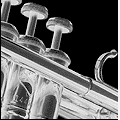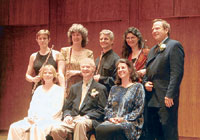


Happy
Birthday, Oberlin graduates who performed at Longy June 9 at a gala concert in his honor were Mark Sparks '82, principal flute of the St. Louis Symphony; Mary Kay Fink '83, solo piccolo of The Cleveland Orchestra; Janet See '73, formerly with the English Chamber Orchestra; and Patricia Spencer '65 of the Da Capo Chamber Players. Ervin Monroe '64, principal flute of the Detroit Symphony, served as master of ceremonies. A highlight was the world premiere of "Apparitions," a commissioned work by Boston composer and flutist John Heiss. In an article about the celebration in the Boston Globe, Sparks said of his revered former teacher: "With each Willoughby student, the mold is broken and a star is born." In "A Tribute to Robert Willoughby," (The Flutist Quarterly, Winter 2001), Leonard L. Garrison '79 wrote: "(Willoughby) cuts a wide swath in the flute world," noting that he is an outstanding pedagogue. "Bob forces students to solve musical problems by asking probing questions: 'Where are you going with that phrase? Why did you stretch that note? How would you make this phrase sound different from the last one?' The result is that his students achieve independence. There is no single Willoughby Style or Willoughby Tone." Recipient
of the National Flute Association's Lifetime Achievement Award
in 1996, Willoughby was assistant principal flute in The Cleveland
Orchestra under the baton of George Szell and principal flute
of the Cincinnati Symphony under the direction of Max Rudolph.
He was a longtime member of the Oberlin Baroque Performance Institute
and a founding member in 1971 of the Oberlin Baroque Ensemble. Cross Partitions as Harmony and Voice Leading," by Associate Professor of Music Theory Brian Alegant appeared in Music Theory Spectrum, vol. 23, no. 1 (June 2001). Also in June, Alegant presented a lecture "Rethinking Luigi Dallapiccola's Harmonic Language" at the Second Biennial International Conference on 20th-century Music at Goldsmiths College, University of London. Additional lectures, "It's Deja Vu All Over Again," "It's About Time," and "You're Grounded" were presented by Alegant in July at the Oberlin Conservatory Piano Festival. Alegant and four of his colleagues in the Music Theory Division pre-sented papers at the 24th annual meeting of the Society for Music Theory (SMT), held November 2001 in Philadelphia. They included Alegant's "A Major Event(s);" Assistant Professor of Music Theory Arnie Cox's "Oxys, Acutus, and the Phenomenology of Sharp Sounds;" Assistant Professor of Music Theory Rebecca Leydon's "Recombinant Style-Topics: Beck, Mr. Bungle, and Emerging Formal Strategies;" Assistant Professor of Aural Skills Deborah Rifkin's "What's Wrong? Tonal Theories and Prokofiev's 'Wrong-Note' Music;" and Associate Professor of Music Theory Lynne Rogers' "Stravinsky's Diatonic Sketch for a Passage from the Flood." Alegant also presented at a session sponsored by the SMT Committee on Professional Development. Stephen Aron, Teacher of Classical Guitar, is featured in a three-disc recording of the complete Chopin Mazurkas for solo guitar, released in October 2001. Aron's recording is complemented by the arrangements, released as The Complete Chopin Mazurkas, 51 Mazurkas, Newly Arranged for Solo Guitar, a 255-page book introduced by Mel Bay Publications, Inc., in October at the Guitar Foundation of America Festival in La Jolla, Calif. Conservatory Librarian Deborah Campana appears in Writings Through John Cage's Music, Poetry, and Art. Edited by David W. Bernstein and Christopher Hatch (Chicago: University of Chicago Press, 2001), the book is the culmination of "Here Comes Every-body: The Music, Poetry, and Art of John Cage," a 1995 conference held at Mills College in Oakland, Calif. Campana's "As Time Passes" explores how Cage's concern for temporal organization remained constant despite changes in musical style and notational resources. Visiting Associate Professor of Historical Performance Richard Cheetham is director of the Orchestra of the Renaissance, a combination of eight to 12 singers accompanied by cornetts, dulcians, harp, organ, sackbuts, and shawms. Their repertoire features sacred music of the 16th and 17th centuries, emphasizing works by Spanish composers. Performances in 2001 included a concert in May at the Royal Academy of Arts, London, and in September at Wratislavia Cantans, Poland. A CD of Morales' Assumption Mass was released on Glossa Music in September 2001. |